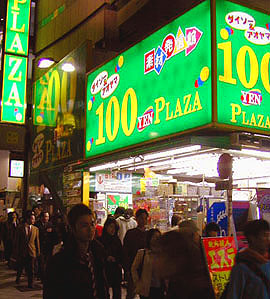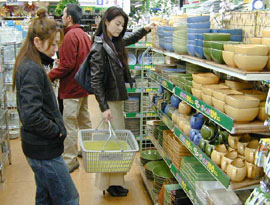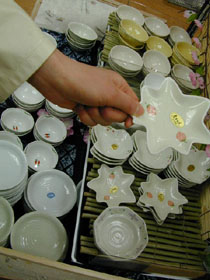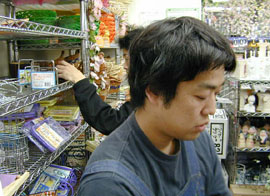Shopping during a Recession: The 100-Yen Store
One of the Captain's great talents is his ability to filter out the news that means the most to his readers - separating the wheat from the chaff, if you will. Always striving to beat the competition, he is on top of the issues and events even before they happen.
 This week he buys into Japan's latest shopping trend, the 100-yen store. Grab a Nixon plastic mask from the rack and join him as he carries his shopping basket through the aisles.
This week he buys into Japan's latest shopping trend, the 100-yen store. Grab a Nixon plastic mask from the rack and join him as he carries his shopping basket through the aisles.
The area around Shibuya Station is one of Tokyo's hippest and hottest areas with young people. Today is Sunday, and the 5-floor Daiso 100 Yen Plaza, situated amongst the hostess clubs, bars, coffee shops, and electronics stores of the area, is abuzz with shoppers.
At this shop, all items are 100 yen. The catch is that the value or need for the merchandise is a bit subjective. For example, a Turkish beer stein? One such patron, 29-year old Kazuko, explains her reasoning: "Because it's cheap."
Yes, it indeed is, and these shops are part of a trend in Japan. Over the last few years, Japan's retail industry has been hit by falling prices. With the nation mired in a recession that has lasted 10 years, deflation and record unemployment have resulted.
But the breadth is limited. This economic condition has not slowed Japanese shoppers' needs for expensive brand-name goods. In this economy, it is only items that were relatively cheap to begin with, like dishes and soap, that are getting cheaper. This is specifically where the 100-yen shop comes in.
 Roughly equivalent in inventory and price to a 99-cent store in the US, an initial investigation into the phenomenon reveals that the major difference between these two discount brethren is location. The US version is usually situated in a low-income suburban area; its counterpart in Japan is found in some of the busier, nicer, and more fashionable areas of the city. Other than that, both variations supply unlimited amounts of scented candles, toothpick holders, portable mirrors, and kitchenware for around a dollar in spaces that would be large enough for housing small aircraft.
Roughly equivalent in inventory and price to a 99-cent store in the US, an initial investigation into the phenomenon reveals that the major difference between these two discount brethren is location. The US version is usually situated in a low-income suburban area; its counterpart in Japan is found in some of the busier, nicer, and more fashionable areas of the city. Other than that, both variations supply unlimited amounts of scented candles, toothpick holders, portable mirrors, and kitchenware for around a dollar in spaces that would be large enough for housing small aircraft.
Since its first store opened in 1991, Hirotake Yano, founder of Daiso Industries Co., has created this new shopping niche across Japan with stores that now number approximately 1,300. In an interview with the Los Angeles Times, Yano says, "I'm dreaming now. I'm just hoping I won't wake up from this dream. Things shouldn't be working this well."
For Yano, revenues have almost doubled this past fiscal year over the year before. New stores are popping up in Japan at a rate of nearly 40 a month.
 Yano's home office is in Higashi Hiroshima in southern Japan. Forty percent of Yano's stock comes from such foreign countries as Brazil, China, Austria, and South Korea. With the recent rise in the value of the yen making these products even cheaper than before, Yano might be one of the few people in Japan that hopes the economic downturn continues.
Yano's home office is in Higashi Hiroshima in southern Japan. Forty percent of Yano's stock comes from such foreign countries as Brazil, China, Austria, and South Korea. With the recent rise in the value of the yen making these products even cheaper than before, Yano might be one of the few people in Japan that hopes the economic downturn continues.
The key to Yano's business is volume. His philosophy is to buy up such large quantities, perhaps hundreds of thousands, of a particular item that retails for, say, 500 yen, that he is then able to purchase each one for less than 100 yen. Then he'll sell it in his shops for a small profit. As a result, he is putting items on his shelves that might retail for 5 times more just up the street.
Highlights of Daiso's Shibuya store include the rubber masks of presidents involved in scandals (Nixon and Clinton), the strap-on plastic breasts, the possibility of recreating a scene from Snow White and the Seven Dwarfs in ceramic miniature, and the spectrum of color achieved when various plastic storage containers are stacked nearly to the ceiling.
Another shopper, Hiroko, says that she is not a frequent purchaser because she might be overwhelmed by temptation. "The price is nice," she says, "but there are so many products that I buy too many extra things."
Variety is an important point in attracting vulnerable shoppers like Hiroko. This is because shopping for these items is more than frugal; it is an adventure or fashion for many people. It is important to have something new everyday, causing customers to return again and again. In other words, a store will ensure that sets of salt and pepper shakers in 18 different colors are on prominent display one day and a collection of pewter Statue of Liberty figurines are the next.
 In keeping with this business plan, the Shibuya store rotates much of its stock daily with nearly every household item imaginable; stationery, stickers, wrapping paper, curios, belts, ties, pots, woven baskets, kites, wooden signs, glasses, and, of course, much more.
In keeping with this business plan, the Shibuya store rotates much of its stock daily with nearly every household item imaginable; stationery, stickers, wrapping paper, curios, belts, ties, pots, woven baskets, kites, wooden signs, glasses, and, of course, much more.
As for the fashion aspect of the business, Kazuko explains, "I think Japanese people used to hesitate to go there for shopping because we would look poor. But now, it's just like fashion."
Will it last if Japan turns things around?
"I think this trend of discount stores will continue even after the economy has recovered," says Hiroko, a university student and a purchaser of soap and toothbrushes.
Yano hopes she is right. But he is not letting success go to his head. In discussing his past business ventures, Yano reveals to the Times, "I learned that good times don't last. Since I haven't been successful, I'm not greedy or rich."

